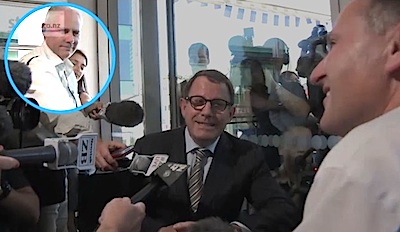
Police explained the delay in reaching a conclusion saying "it took time to talk to those involved, particularly members of public who were in the cafe" But no investigator has spoken to me ... and I was standing right there. (pic: stuff.co.nz)
So, it’s been announced the cameraman who recorded the pre-election ‘cup of tea’ between John Key and John Banks in November last year won’t be prosecuted. Stuff.co.nz reported:
Police will not lay charges over the “teapot tape” saga and say freelance cameraman Bradley Ambrose has received a warning. Assistant Police Commissioner Malcolm Burgess held a press conference this afternoon and said police had resolved the case. While he only received a warning, Ambrose’s actions were illegal, Burgess said.
Illegal? Oh really? That’s an opinion, surely? Perhaps a qualified one, but an opinion not tested in court, I’d say. Unlike the ‘organised criminal group’ charges which fell over last week.
“We were satisfied on this occasion that there was [prima facie evidence]. But police decided there was not sufficient public interest in the matter going to court, he said. “I reached the view that a prosecution was not required in this instance.”
Not sufficient public interest? Oh. I see.
In the view of police investigators, the recording was “most likely” on purpose, but at the least “reckless”. Burgess said he would still advise media organisations not to play the tape
Oh, so the police ‘advise’ media organisations not to play the tape? Why? Is that another ‘shot across the bows’ of the news media? So, there’s insufficient ‘public interest’ in prosecuting the guy who recorded it! Why would there be more ‘public interest’ in prosecuting media outlets who distribute it?
Asked why the inquiry took so long, Burgess said it took time to talk to those involved, particularly members of public who were in the cafe.
That’s intriguing. They spoke to the public? Funny thing: I was there, in the cafe (see blue circle in the frame from Fairfax video) … and, although I think I can credibly be called an eye witness, I haven’t been approached by anyone investigating the case to discuss what I observed happen that afternoon — and I was standing right at the table.
Is it possible a sense of constitutional decorum seeped into the police investigation? Such that they decided not to interview the journos there? Or, having issued ‘advice’ and search warrants to news media organizations in the lead-up to the general election (and creating headlines around the world thereby) did the police perhaps think better of inviting the qualified witnesses available in for a quiet chat … over a cup of tea?
– P
Update: Good thinking on the issues from Andrew Geddis and Russell Brown.


Well, according to the NZ Herald today, police DID speak to some selected members of the fourth estate about what they saw transpire at Urban Cafe that afternoon.
In a fairly toughly worded editorial, the paper again defends the news media (and the Herald in particular) from John Key’s allegations of scurrilousness … and discloses police interviews with journos did take place.
The paper makes clear their view of the National Party leader’s so-called stand on principle …
The police should never be used as attack dogs for enraged (or embarrassed?) politicians. I still shudder at the Mugabe-like image of the Prime Minister summoning police to his Beehive office and laying a formal complaint — instructing them to investigate.
Yesterday’s long-time-coming pathetic backdown by police was predictable except for the confusing messages. It may prove to be a significant milestone in John Key’s populist fairy tale. Or not.
http://www.nzherald.co.nz/opinion/news/article.cfm?c_id=466&objectid=10794768
John Hartevelt calls it ‘grubby’ from start to finish…
http://www.stuff.co.nz/national/politics/6640067/Thank-goodness-teapot-saga-is-ove
The hostility toward ‘da media’ that is being emoted by some in positions of political power and their proxies is very obvious.
Brushed off lightly by such spokesmodels is the pseudo-constitutional outrage (I mean it) of police being sent into news organizations with search warrants and being sent warnings by police pointing out the penalties of publishing ‘private conversations’ (arm twisting, in other words) during an election campaign.
Some might say I’m bring precious, but that kind of attempted control and manipulation of the ‘free’ press is a step too far, and demonstrates an arrogance that is out of place — and is usually punished in the voting booth. Eventually.
John Armstrong’s line about a blind spot on John Key’s political attenae seems right:
http://www.nzherald.co.nz/nz/news/article.cfm?c_id=1&objectid=10794807
John’s softener: ‘normal transmission now seems to have been restored’ is sweet. The handling of Nick Smith’s sacking/resignation gives some pause.
-P
[…] the police investigation led to no charges but merely a policeman’s untested statement that Ambrose had acted ‘unlawfully’ […]